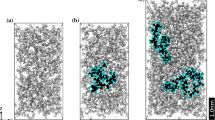Summary
Shearing at constant gradient of polyisobutylene (PIB) solutions in viscous polybutene oils results in time dependent changes of their viscosities. Two PIB fractions (M=8·106 and 3.8·106) have been studied in a variety of solvents, covering the viscosity range from 5 to 0.5·10−2 poise. The overall phenomenon is similar to that already observed for polymethylmethacrylate, polystyrene, and polyethylene oxide solutions in Aroclor.
Results have been discussed in terms of polymer molecular weight and concentration, solvent viscosity and gradient. The systems investigated are free from strong polar interactions and tendency toward molecular aggregation; time dependent changes of viscosity are therefore observable also for true molecularly dispersed solutions.
Zusammenfassung
Scherung mit konstantem Geschwindigkeitsgradienten von Polyisobutylen (PIB)-Lösungen in viskosen Polybuten-Ölen ergibt zeitabhängige Änderungen ihrer Viskositäten. Zwei PIB-Fraktionen (M=8·106 und 3,8·106) wurden in einer Vielzahl von Lösungsmitteln untersucht, die den Viskositätsbereich von 5 bis 0,5·10−2 Poise überdeckten. Das phänomenologische Erscheinungsbild ist ähnlich dem schon beobachteten für Polymethylmethacrylat, Polystyrol und Polyäthylenoxid-Lösungen in Aroclor.
Die Ergebnisse wurden hinsichtlich des Polymer-Molekulargewichts und der Konzentration, der Lösungsmittelviskosität und des Gradienten diskutiert. Die untersuchten Systeme sind frei von starken polaren Wechselwirkungen und von Tendenzen in Richtung auf molekulare Aggregation. Zeitabhängige Änderungen der Viskosität sind deshalb auch für wahre molekulardisperse Lösungen beobachtbar.
Similar content being viewed by others
References
Peterlin, A. andD. T. Turner, J. Polymer Sci.B3, 517 (1965).
Peterlin, A., C. Quan andD. T. Turner, J. Polymer Sci.B3, 521 (1965).
Peterlin, A., D. T. Turner andW. Philippoff, Kolloid-Z. u. Z. Polymere204, 12 (1965).
Matsuo, T., A. Pavan, A. Peterlin andD. T. Turner, J. Colloid Interface Sci.24, 241 (1967).
Peterlin, A., J. Lubrication Technol.,1968, 571.
Peterlin, A., Symp. on the Role of Molecular Entanglement, Brooklyn Polytechnic, May 1966, Brooklyn, New York.
Peterlin, A., Rheology of Polymeric Materials, Polymer Conference, Wayne State University, May 9 to June 24, 1966.
Moore, R. S., private communication.
Bianchi, U. andA. Peterlin, J. Polymer Sci., Part A-2,6, 1011 (1968).
Flory, P. J., Principles of Polymer Chemistry, (Ithaca, N.Y. 1953).
Peterlin, A. andD. T. Turner, Nature197, 488 (1963).
Author information
Authors and Affiliations
Rights and permissions
About this article
Cite this article
Bianchi, U., Peterlin, A. Time dependence of viscosity of dilute polyisobutylene solutions. Kolloid-Z.u.Z.Polymere 232, 749–752 (1969). https://doi.org/10.1007/BF01500649
Received:
Issue Date:
DOI: https://doi.org/10.1007/BF01500649




